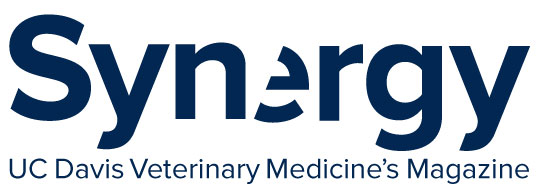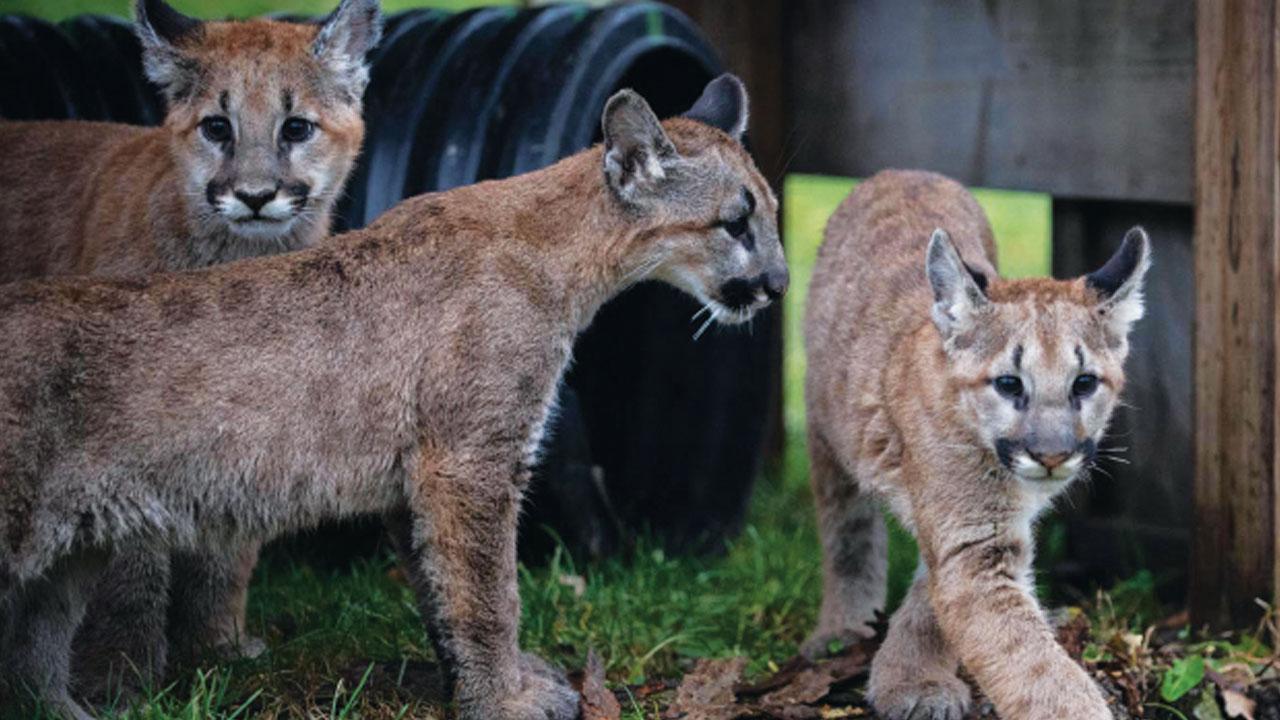
News Bites
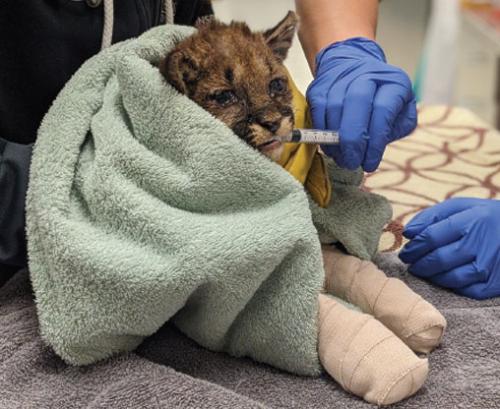
New Rescue Network
Mountain lion cub Captain Cal was one of the lucky ones. Orphaned and severely burned, he was found by firefighters during the 2020 California wildfires, successfully treated, rehabilitated, and is now settled in his forever home at the Columbus Zoo and Aquarium. But what about wildfire-affected wildlife that aren’t so fortunate?
The unprecedented fire season brought gaps in disaster response for wild animals into sharp focus. Although a fair amount is known about the impact of wildfires on humans and domesticated animals, there is surprisingly little information about how they affect wildlife. The newly formed Wildlife Disaster Network (WDN) is working to change that.
Designed with the goals of finding, treating, and rehabilitating these animals, the WDN is a partnership between the school and the California Department of Fish and Wildlife. These groups successfully teamed up in 2017 to treat animals burned in the Thomas Fire with a novel approach – pioneered by Dr. Jamie Peyton, chief of the UC Davis veterinary hospital’s Integrative Medicine Service – using biological bandages made from tilapia fish skin.
The WDN now aims to formally mobilize the people and resources needed to aid wildlife that are affected by wildfire and other disasters. It is meant to be a collaborative process that can function within any emergency incident command structure to bring together experts to respond to injured animals and prevent suffering.
In addition, the WDN hopes to promote collaboration, advance knowledge of the long-term impacts of these massive disasters on wildlife, and formulate plans for intervention, especially in areas with threatened species. All data collected by WDN participants will contribute to a framework of scientific knowledge that is currently absent.
The WDN is modeled after the UC Davis-led Oiled Wildlife Care Network (OWCN), which was created in 1994 to mobilize volunteers and professionals to rescue and treat shorebirds and other wildlife impacted by oil spills. The new network will be comprised of veterinarians, wildlife biologists, ecologists, trained animal care volunteers and rehabilitation centers that follow the four core principles set by the OWCN: readiness, response, research and reaching out.
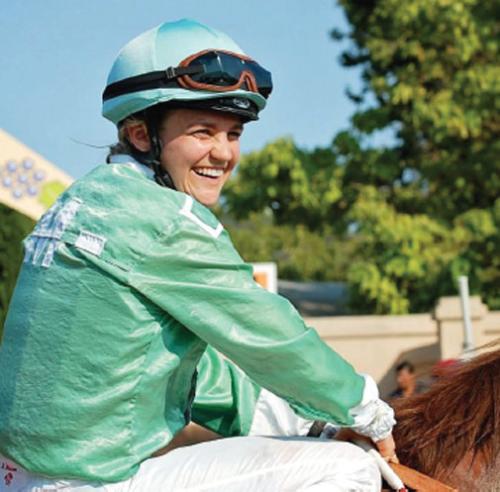
Setting a Course
Since earning her DVM from UC Davis in 2019, Dr. Ferrin Peterson has been turning heads in the East Coast jockey colony. Moving from apprentice to contender, Peterson registered 42 wins at Monmouth Park in New Jersey (the meet’s second highest mark) and transitioned to the big time at Aqueduct in New York, all amidst the backdrop of the COVID-19 pandemic. The transition has been challenging, but she notes that having veterinary knowledge provides her with unique opportunities to contribute to conversations with trainers and owners, discussing rehabilitation procedures, and different ideas and approaches to equine management. The Roseville native is used to being a trailblazer and tackling challenges head-on. Peterson knows her educational background provides her with many career options, and she plans to embrace these unique opportunities to combine her veterinary knowledge with her love of riding racehorses to see where they take her.
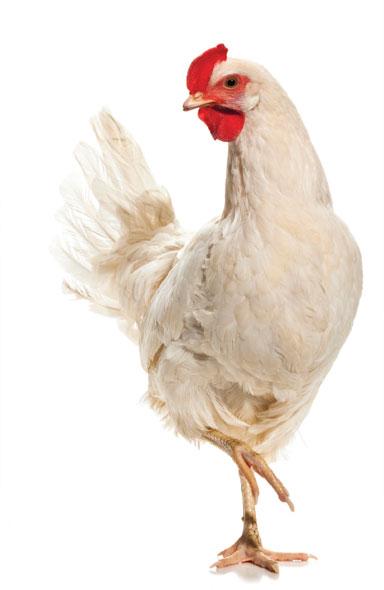
Got Poultry? We Have an App for That
A new poultry app, Backyard Poultry Central, has been developed by veterinarians with the UC Cooperative Extension. The tool is designed to help backyard and game bird owners stay up-to-date on best poultry practices, new research, and disease outbreak information. Content is updated regularly; features to be added soon include alerts for emerging outbreaks, content filters and searching, and more. The app is now available on Google Play for Android users, with a home screen in both English and Spanish.
Extending a Caring Hand

Students of the school have opened a new clinic offering veterinary services to pets of the homeless. Davis Pet Advocacy and Wellness (PAW): A Clinic for the Pets of the Homeless is a local satellite clinic of the Mercer Veterinary Clinic for the Pets of the Homeless in Sacramento. The students plan to establish monthly clinics in Davis to provide valuable services to the community’s homeless population, hands-on experience for UC Davis veterinary students, and an opportunity for research related to the health of this pet population. The new clinic arose out of faculty member Dr. Janet Foley’s desire to provide for an important demographic that wasn’t being served. The clinic is a joint effort between members of the veterinary school, the City of Davis, and CommuniCare Health Centers. The Davis PAW team consists of volunteer veterinarians, veterinary students, and community members working with the City of Davis to increase access to care and promote the well-being of animals.
Equine PET Scans Making a Difference

The world’s first MILE-PET device, a positron emission tomography (PET) scanner specifically designed to image standing racehorses, was installed at Santa Anita Park in December 2019, as one of several measures to reduce breakdowns at the racetrack. Over the previous four years, a UC Davis team demonstrated that PET could detect abnormal changes in bones of racehorses under general anesthesia that were not seen with other imaging modalities. LONGMILE Veterinary Imaging developed the MILE-PET scanner for safe imaging of standing, lightly sedated horses. Dr. Mathieu Spriet, a veterinary radiologist at UC Davis who leads the research on equine PET, reported that 188 PET studies were successfully performed at Santa Anita on more than 100 different horses, with many horses imaged multiple times to follow the evolution of bone changes over time during the last year. Half of the PET scans were part of sponsored research projects, while the other half were requested by racetrack veterinarians for specific assessment of horses under their care.

Better Understanding Foodborne Pathogens
How do foodborne pathogens contaminate produce and make people sick? A new multi-year, longitudinal study hopes to find those answers. A partnership between the U.S. Food and Drug Administration (FDA), the California Department of Food and Agriculture, the UC Davis Western Institute for Food Safety and Security, and agricultural stakeholders in the Central Coast of California will study the ecology of human pathogens in the environment that may cause food-borne illness outbreaks. The effort is a continuation of the FDA’s 2020 Leafy Greens Shiga toxin-producing E. coli (STEC) Action Plan, which sought to respond to a series of E coli 0157:H7 outbreaks in recent years. The study will collect and analyze samples from the environment, including from adjacent land, well and surface waters, along with soil inputs that include compost, dust, and animal fecal samples, with the goals of examining how pathogens survive and move through the environment.

Gorillas Test Positive for SARS-CoV-2
Biological test samples from two gorillas at the San Diego Safari Park were submitted to the California Animal Health and Food Safety Laboratory at UC Davis after they began coughing. The samples tested positive for SARS-CoV-2, the virus that causes COVID-19, with the results confirmed by the National Veterinary Services Laboratory. It is suspected that the gorillas acquired the infection from an asymptomatic staff member, even though they were in full personal protective equipment. While research studies verified the susceptibility of some non-human primates to COVID-19, this represented the first known case of natural transmission of the disease from humans to these primates. According to the San Diego Safari Park, all of the gorillas are doing well.
